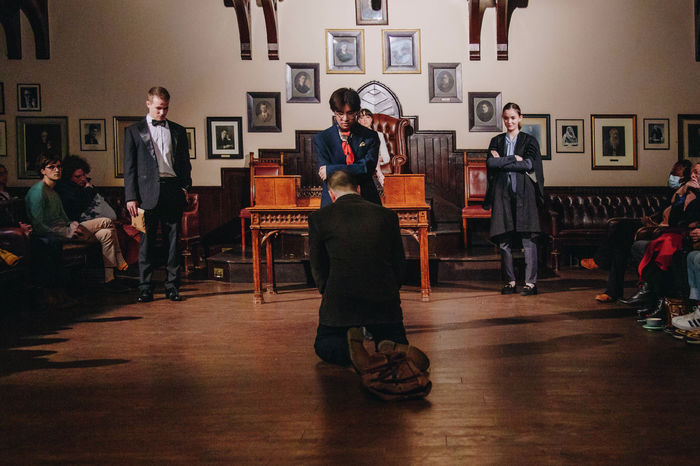And Then There Were None had us on the edge of our seats
Writer Ben Conway reviews the adaptation of Agatha Christie’s celebrated novel at Queens’ College

Agatha Christie is one of the best-selling fiction authors of all time, meaning that any theatre adaptation of her stories is under pressure to do her justice. This production of And Then There Were None at Queens’ College succeeded in doing so, and more, with an impressive performance to a sold-out audience on its closing night. It’s a classic ‘whodunnit’ murder mystery, where the ensemble are killed off one-by-one in line with a sinister and foreshadowing poem. The play is famous for its ability to string the audience along, and while I can only speak for myself, I was on tenterhooks right until the final curtain.
This was in no small part due to an impeccably chosen cast, with actors perfectly suited to their roles. Impressive accents and apt costume choices by costume designer Cody Knight helped the audience to immerse themselves into 1930s England, and the actors’ excellent dynamic provided valuable insight into societal attitudes on class and gender at the time.
“An impeccably chosen cast, with actors perfectly suited to their roles”
Sophie Carlin as Vera Elizabeth Claythorne gave a standout performance, carrying scenes along with her charming counterpart, Philip Lombard (played by Hugo Gregg). I felt disappointed to see Tony Marston (Emma Obrien) and Ethel Rogers (Mia Asquith) depart fairly early on, due to sensational embodiments of their respective characters. Louis George as Dr. Armstrong played a convincing nervous wreck and Matthew Sargent, playing the criminal mastermind, was remarkably adept at representing an unhinged psychopath. Catherine Strong deserves plenty of credit for endearing herself to the audience despite playing arguably the least likeable character, Emily Brent, drawing laughs with every other line. Naima Clarvis as Detective Blore, Daniel Pereira as Thomas Rogers, and Ella Scott as the old General all put in stellar performances, completing an excellently well-rounded cast.
In spite of a plot line with heavy themes centring on trust, justice, and mortality, the cast managed to keep the tone light-hearted with exaggerated characterisations. Musical accompaniment from Coby O’Brien, Louis Henry, and Jack Medlin, and lighting changes by Simon Sheriff and Wesley Barrett tended to be subtle, though very effective. The set was crafted cleverly by Amelia Mielniczek to portray the isolation of the island, and to allow the actors easy movement during particularly active scenes. The actors were confident and always audible, despite the best efforts of the girl behind me to drown them out with her bag of crisps.
“The set was crafted cleverly by Amelia Mielniczek to portray the isolation of the island”
Directors Jessica Udeh and Louella Lucas deserve many plaudits for an extremely well executed (if you’ll pardon the pun) production. The casting of female actors to play male characters felt fresh, and put a nice spin on a play that sometimes threatens to feel a little bit stale, given how frequently it is performed. Noticeable also was a timely interval, and the sparing usage of raised voices in angry and frustrated scenes where they could reasonably have been used, increasing tension when it did occur. Overall, this came across as a play in which even the smallest of choices were considered so as to ensure that the best option was selected each time, and it felt like the directors did indeed tend to get it right. In short - that was my first experience of Cambridge theatre, and thanks to the cast and crew of And Then There Were None, it certainly won’t be my last.
 News / Candidates clash over Chancellorship25 April 2025
News / Candidates clash over Chancellorship25 April 2025 Interviews / Dr Ally Louks on going viral for all the wrong reasons25 April 2025
Interviews / Dr Ally Louks on going viral for all the wrong reasons25 April 2025 News / Cambridge professor paid over $1 million for FBI intel since 199125 April 2025
News / Cambridge professor paid over $1 million for FBI intel since 199125 April 2025 Music / The pipes are calling: the life of a Cambridge Organ Scholar25 April 2025
Music / The pipes are calling: the life of a Cambridge Organ Scholar25 April 2025 Comment / Cambridge students are too opinionated 21 April 2025
Comment / Cambridge students are too opinionated 21 April 2025






